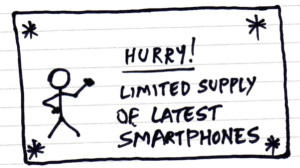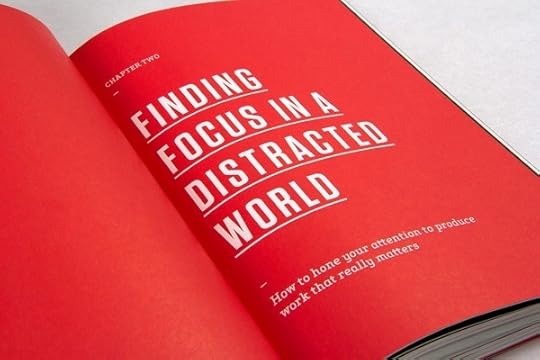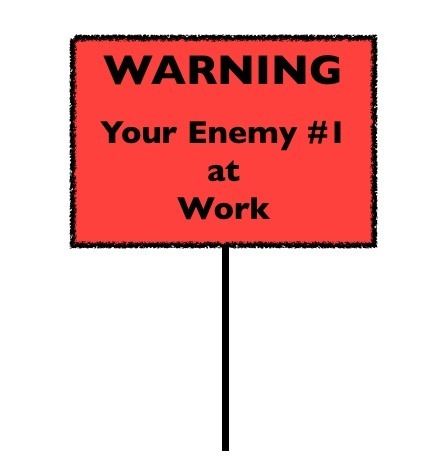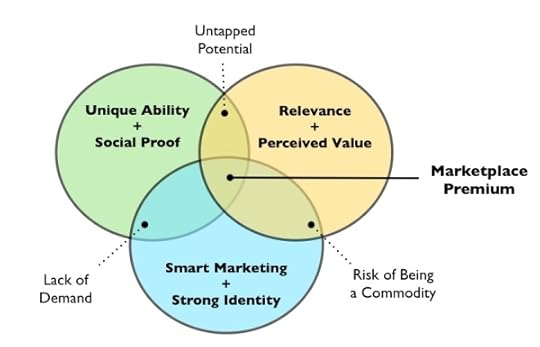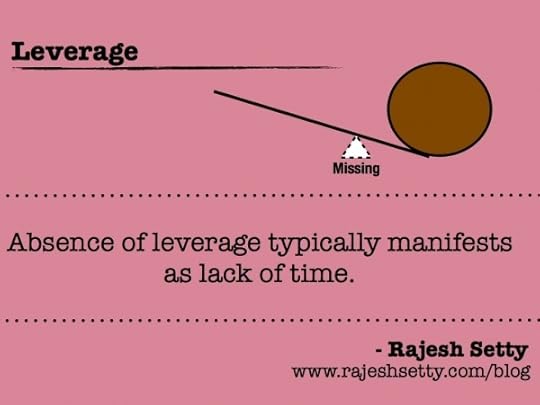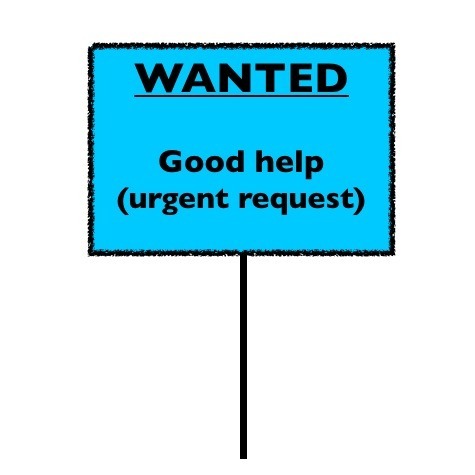Rajesh Setty's Blog, page 3
October 19, 2013
Mini Saga #131 – Important
Mini Saga #131 – Important
It was peer pressure that made Tom look for one of the latest smartphones. The enthusiastic salesperson went over two dozen features. “This has an app that can show the level of your happiness,” he said. Tom scratched his head and asked, “Can I also make phone calls with this?”
It is easy to get carried away…AND forget the basics.
Note:
1. A mini saga is a story told in exactly 50 words. Not 49 or 51 but exactly 50.
2. You can download a photographic manifesto of Mini Sagas at ChangeThis. Here is the link – Mini Sagas: Bite-sized Wisdom for Life and Business (PDF, 2.9MB).
3. For a complete list of Mini Sagas, please see the entire list here or at Squidoo







October 1, 2013
4 Insights From the Interview With Jocelyn Glei of 99U.com
I had a delightful conversation with Jocelyn Glei, Editor-in-Chief of 99U.com about the first book “Managing Your Day to Day” in their book series aimed at educating creative professionals.
About Jocelyn Glei
 As Editor-in-Chief and Director of 99U, Jocelyn K. Glei leads the 99U in its mission to provide the “missing curriculum” on making ideas happen.
As Editor-in-Chief and Director of 99U, Jocelyn K. Glei leads the 99U in its mission to provide the “missing curriculum” on making ideas happen.
She oversees the Webby Award-winning 99u.com website, curates the popular 99U Conference, and is the editor of the 99U books, Manage Your Day-to-Day and Maximize Your Potential.
She is passionate about creating content-driven products that people love.
How the Book Series Project Came About:
The trigger was a conversation with the editor of Scott’s book “Making Ideas Happen” and brainstormed ideas for a book series. The key question was to figure out a set of problems that every creative person was struggling with and address those problems in a series of books.
That quest resulted in three over-arching themes for the book series:
1. Manage Your Day to Day | How do I organize and make the most of the day
2. Maximize Your Potential | How do you build a great creative career
3. Make an Impact (working title) | Your ideas and your business in the world
The first book in the series was on time management. There were a lot of books that talk about time management that talk to the managers and not the makers. Jocelyn and her team’s goal was to get 20 super smart thought leaders to comment on this topic in a way that resonates with creative people – the makers.
I asked Jocelyn what would be three key takeaways from the first book and here is what I got
Three Takeaways from Book #1
Disclaimer: Jocelyn acknowledged that there were dozens of insights in the book (I agree) but if she had to pick only three, she would go with the following ones:
1. The idea of being willing to say No. How you structure your daily routine and making sure that you are creating focus blocks will determine how much you will get out of the day. You know that you need to spend time on your creative projects with the same respect that you give to the meetings with someone. Setting aside 2 or 3 hours during the day where you can work in a focused fashion on your creative projects will make a huge difference.
2. Most things can wait more than you think you can. We are caught up in this kind of a rat race and we assume that we need to “respond” to something. You set the tone for what people can expect out of you. You feel the need to respond instantly to everything but that is a self-created problem more than anything else. You have to be able to disconnect.
3. Resting and Refueling. This was an idea from Tony Schwartz. The maximum amount of time that you can go deep and perform at your peak abilities is about 90 minutes. Then, you need to rest for at least a few minutes. There are so many things to engage all the time so you keep going and going and going. In a 10-hour work day you might have only accomplished real work in the six hours of those ten hours. You need to control your schedule and include resting and refueling into the mix.
Bonus Insight:
Not to stop there, I asked Jocelyn what would be one insight that surprised her as she collected these insights from the thought leaders. This is the one she picked:
4. Be careful about the Email Apnea. The most surprising insight for Jocelyn was from Linda Stone’s essay about Email Apnea. There is a tendency to breathe shallow and that has physical manifestations – not good ones of course. If you are checking email too often, it elevates your stress and almost puts you into flight or fight mode. This is strenuous to your body in a negative way.
I enjoyed the book very much and I know you will benefit from this whether you are a maker or not. You now what to do 







September 28, 2013
Scale Matters.
No, I am not referring to the scale that refers to growth of a company. The scale I am referring to is what that you use to measure something.
Yesterday I was at the gym. I was at the end of my mini exercise routine on an exercise machine. A young boy started exercising on a similar equipment right next to me. His Dad setup the equipment for him and the boy was in a hurry to finish his exercise. After some time, it seemed like he was competing with me. I smiled a couple of times and continued what I was doing.
After ten minutes, I was about to wrap up, the boy turned to me and said, “Did you see, I can do it faster than you..”
I smiled and said, “You sure can, good job.”
He smiled a big time and I left. I never bothered to tell him that his equipment was set to level 3 as opposed to level 10 on my equipment. It would be silly to argue with a small boy and prove him something. The best response I thought would be to simply agree and make his day.
Think about it…
This behavior is not limited to young people. Professionals fall into the trap as well. Someone you know my be engaged with being “very proud” of what they have accomplished or contributed albeit forgetting to notice the scale with which they are measuring what matters.
The response from others watching them will be similar to my response to that young boy – “a virtual pat on the back.” Rarely will anybody has time to make them notice the “scale” in question. Why confront and add more drama, right?
Watch your scale before speaking or better yet, don’t make your accomplishments or contributions a big deal as there is always a lot happening at a “different scale” across the world.
Image Courtesy: Science Toys







September 20, 2013
Defining Moments and Talk at SF on September 24
If you are reading this, you are old enough to have had several defining moments in your life. A defining moment in your life is very simply an event, an experience, a conversation or a realization that something needs to shift in your life for the better. A trigger that will lead to a change in the trajectory of your life for good.
I am fortunate to have a number of defining moments in my life that have shaped my life so far. I have captured a few of them in a series of articles I am writing on Medium.com.
Here are the links to the latest four posts
1. My first six months working for a local newspaper
2. Our first trip to the outlet malls
3. My first experience with snow
4. Three life lessons from traveling on Mumbai Trains
If you want to read the entire series (right now there are a total of eight such defining moments in the series) you can access all of them below:
Rajesh Setty: Writings on Medium.com
Request: If you like any of the posts on Medium.com, kindly click on the Recommend button to support my writing there.
Talk at SF: The Art of Peaceful and Parallel Entrepreneur
I will be speaking on the above mentioned topic in San Francisco this Tuesday, 24th September 2013. The event is organized by TiE SF and is free for those who register. The event takes place from 6pm to 8.30pm. You can read all about the event and register below:
There are about 80 people registered so far and I look forward to seeing some of you there.
SF Event Details and Registration Link







September 10, 2013
Five Reasons You Might be Ignoring Your Greatest Competitor
There is a competitor that you should be scared of.
And that competitor is…
Drum roll..
Status Quo.
Yes, status quo is a competitor that is more powerful than your most powerful competitor. Status quo as you are aware is for your prospect or your target audience to do nothing or continue to do what they are doing without being touched by what you are offering.
If you don’t defeat this competitor, there is no progress possible.
So, why would you ignore such a formidable competitor?
Here are a five reasons:
1. You definitely LOVE your product more than others do
You LOVE your creation – no surprise there. But you take it a bit far thinking what’s obvious for you is super obvious for everyone. You are so convinced that what you got is REQUIRED by the marketplace that you simply ignore comments from those that don’t “get it.”
What to Remember: Your bias will blind you to information that does not support the “fantasy.”
2. You think any smart person will “get it” – it’s a no brainer
You have showed what you have created to others starting with your family and friends and even friends of friends. Everyone has given you positive response. You later talked to potential customers and they said cool things about it. Some of them even asked you to keep them posted. It is no wonder that you think smart people will get it – it’s a no-brainer.
What to Remember: Smart people are always curious and want to know what you are doing. That in no way should be construed as they are interested in “buying.”
3. You are enamored by getting ahead of the competition
You have assigned one team member to be in-charge of competitive analysis. Your team member is very diligent and thorough. He keeps you abreast of the latest in the world of your competitors. You put your product team on fire to ensure that you are well ahead of the competition. You are not just stopping there because you know your competition is working on the next big thing…
What to Remember: You cannot focus on the competitors at the risk of losing focus on your prospects and customers.
4. It was easy for you to get used to your product. So, it should be easy for others
You are very comfortable using your own product. Yes, there were some initial hiccups, a few bugs to deal with but finally you got there within no time. It is now in your second nature to use your product. How hard could it be for others to adopt it?
What to Remember: Change is HARD. Think long and hard about the “first-time use.” Most initiatives fail right there.
5. The First Few Customers are Happy
You have worked hard to ensure that your first few customers are delighted. Unfortunately, you have forgotten that all of these people are those that you have had a prior relationship with. They are more forgiving because of this prior relationship.
What to Remember: You have to cross the CHASM to be successful. The early adopters are usually a minority. Winning over them is a good start but not everything.
In summary, there is NOTHING good that will come out of ignoring this competitor. So, you might as well face him/her head on.







September 8, 2013
The Path to Commanding Marketplace Premium
Commanding a premium in the marketplace is not about reaching a destination – it’s about crafting and re-crafting your journey as long as you want to play the game.
If commanding a premium is on your wish list, consider the following three elements:
1. Unique Ability + Social Proof
You should have some unique ability that will solve a real problem for your target audience or alternatively will open up a new set of possibilities for them. Dan Sullivan of Strategic Coach Program says, your unique ability is a combination of your personal talents, passions, and skills. Dan says most people have not taken the time to identify their unique ability.
A quick example: If you are an amazing negotiator and love that craft, you can help your clients get more profits through your negotiation skills.
The second part of the equation is equally important. You need social proof to make other people believe that you do HAVE that unique ability. Otherwise, it’s a
2. Smart Marketing + Strong Identity
The way people find out about who you are has changed completely. Gone are the days of “on the face” advertising. What works now is that you demonstrate your knowledge by giving at least part of it online (books, presentations, eBooks, audio, video) and offline (seminars, panel discussions, workshops, webinars). The “smart” part comes when you get yourself embedded and engaged in the community rather than trying to pontificate your ideas.
The second part of the equation – a strong identity will help you tremendously with your marketing as a super strong identity lowers the marketing costs by a wide margin.
3. Relevance + Perceived Value
Your unique ability has to be relevant to the current marketplace. If it is relevant, the underlying concerns that are looking to be addressed will be part of the conversations in the community of your target audience.
This is easily verified and validated by the second part of the equation (perceived value). If the marketplace assigns a high perceived value, there is a good chance that it passes the relevance test.
All three are important
If you are covered on “unique Ability + Social Proof” AND “Relevance + Perceived Value,” you have Untapped Potential. You are probably partly invisible to the marketplace
If you are covered on “Unique Ability + Social Proof” AND “Smart Marketing + Strong Identity” you are probably facing a lack of demand due to lack of relevance.
If you are covered on “Smart Marketing + Strong Identity” AND “Relevance + Perceived Value” you are at the risk of being a commodity as there may be many others who bring what you bring to the table. This is one of those situations where everyone together are participating in a race to the bottom.
Cover all three and you have a good chance of commanding a marketplace premium.







September 7, 2013
The insanely Simple Key to Boost Your Leverage
The insanely simple key to boost your leverage is to consistently collect the right “rain checks” from smart people.
Warning: Insanely simple only refers to the understanding of this concept and not the implementation of the concept. In life, to get real results, you have to pay real price. No shortcuts there.
Let us go through the concept in detail.
I have said it many times on my blog that the most powerful force on earth is the power of reciprocation. Capitalizing on it the right way would open a ton of possibilities for you and your business. I said the “right” way because the wrong way would be for you to wait for someone to help you and then you activate the power of reciprocation to help them back. That would not hurt but it rarely is as helpful as the other way around.
The Core Concept
First part of the concept is to trigger a feeling of reciprocation
Your goal has to be proactive in doing something first that would trigger a feeling of reciprocation from the world. That “doing something” has to be meaningful enough for that feeling to be meaningful enough.
As in any such thing in life, there is a range of possibilities for you to trigger the power of reciprocation. Let us go through the stack on the power scale.
1. Tiny Random or Designed Acts of Kindness:
You can start small by doing either random acts of kindness or you could adopt a routine where you are doing designed acts of kindness. At the lowest level, these will look like common sense or common courtesy or as you move up on the value chain, they will start looking like “uncommon caring.” Uncommon not in the value but because most other people are super busy and absorbed in their own world to care enough about others.
2. Measurable Impact:
At the next level, there is a measurable impact for the other person either for their business or their life. Measurable is the keyword. It is not a feel good thing. It has to pass the “third party test” meaning when they share how you helped them to a third party, they should be able to explain the “real value” you added. If they stop at explaining how good you made them feel, it is only a good start and at best you might get some motivational speaking gigs later in life but the needle would not have moved to matter much.
3. Positive Change in the Trajectory of Their Life:
What’s better than the two before is that you change the trajectory of where they are going in a positive fashion. Changing the trajectory has immediate AND long-term benefits. They see immediate value with the positive shift in something that’s close to them and in the long-term, they will see that they ended up in a much better place than they would have been without you.
4. Enrichment:
The epitome of this is to enrich someone’s life. We are all on a search – a search for meaning in our lives. Through choosing to enrich other people’s lives, you add meaning to both their life and your own. How do you know you are truly enriching someone’s life? There is a litmus test for that. You can download this one pager (for FREE) on enrichment here and I have outlined the litmus test there.
Note: There is a reason why I have not included the litmus test here. I have only touched enrichment at a superficial level and before you go on to see what the litmus test is, I want you to read the missing discussion on this topic and only then the test makes sense.
That’s the first part – triggering reciprocation.
The second part is easier than the first part. When they do offer to reciprocate, you can simply say, I will take a rain check. This means you might go back to them some day for some help or you will allow them to help you someday but today, you just will be happy to collect a rain check.
Just so that we set the expectations right, most of these rain checks you will never cash EVER. You can read more about the reasons here – How to get your network working.
The Magic:
That point is not just about capitalizing on the overwhelming collective force of reciprocation being available to you as a reservoir. That will DEFINITELY help. It is hard to fail if you have an over-supply of good help on our side.
During this entire journey, just the act of collecting rain checks would boost your capacity so much that you will notice a boost in your leverage without a single person doing anything back to you.
Check out an entire course (by invitation only for now) on the topic at The Art of Leverage.







September 3, 2013
What you might really be saying when you say you are super busy…
Meredith Fineman wrote a brilliant article on HBR blog urging people to stop complaining that they are very busy. Her key point: people are trying to be in the one-upmanship game of trying to show that they are more busy because they are more important.
Fineman has a point and the problem is amplified with social media as people in the above category have found new mouthpieces (Twitter, Facebook etc.) to announce how busy (and hence how important) they are.
Being chronically busy is a problem rather than an asset.
If you think about it, being busy is almost at the opposite end of having autonomy. Remove autonomy and remove power and you are left with “being busy” and having no choice about it.
Here are a few messages (or a combination of them) you might be sending when you announce you are super busy. These are in no particular order.
[Fair warning: This is a tongue-in-cheek list. If you can't handle subtle humor or you get offended by reading a blog post of any kind, you can skip reading below ]
1. I don’t have time for you but don’t want to directly say it. Let me use the “busy” mask so we don’t make this an awkward conversation
2. I am super smart and hence working on many things ALL at once. But, I don’t know how to manage them well. Hence I am busy.
3. Look Ma.. I am so busy
4. I have no clue on how to automate and outsource. I end up doing everything myself. Hence I am busy
5. People think I can do a lot of things. So they keep piling things on me. I keep taking them on and finally get overwhelmed and hence feel that I am very busy.
6. I am not competent on many areas I am involved with. So it takes me longer to complete the projects and hence i am very busy.
7. I don’t do planning well so generally that ends up keeping me very busy
8. My team is not that competent and they end up reverse-delegating work back to me. I end up doing their work and hence i am super busy
9. I don’t know what I am doing really but not doing anything will scare the hell out of me. I want to escape that feeling so end up doing anything and everything. Hence I am super busy
10. I am not really that busy at all. But every smart person around me seems to be super busy so I am telling everyone that I am super busy too.
11. I have an over-commitment problem leading me to be super busy.
12. I don’t know how to say “No” and end up saying “Yes” to every request even the ones that require me to learn something before executing. Hence I end up being super busy.
13. If my calendar is not full, it freaks me out. I start adding tasks and meetings so that I can avoid real work. Hence I am super busy.
14. Being super busy is super cool I think. Hence I am super busy.
15. I lack estimation skills. I under-estimate the time it takes to complete my projects. Hence I am super busy.
16. I don’t want you to add any more things to my plate. So I am saying I am super busy
17. I want to attend a time management course but I don’t have the time to attend it. Until then, I will be very busy.
18. I am yet to learn how to prioritize what I have signed up for. I procrastinate until it’s too late and hence end up being very busy.
19. Everyone in my company say that they are very busy. That’s what my Manager likes. So I will go with the flow.
20. I don’t know what you will think of me if I say that I am not very busy. Hence I will say I am super busy.
21. I don’t love what I am doing so it looks like a mountain of work. Hence I am busy.
I am sure you can add to this list 







September 2, 2013
Seven Dilemmas for First-Time Entrepreneurs
Any meaningful AND significant pursuit will involve a huge learning curve.
Some pursuits are “safer” than others as your long struggle can be private before you ultimately expose yourself in public. Examples of such pursuits are some kinds of music or some kind of sports where a large part of the training can happen in private.
Entrepreneurship, however, is a largely public sport. To gain real traction, you have to touch several stakeholders in public. So, you are “exposed” from the word “Go.”
With the above in context, here are seven dilemmas you might face as a first-time entrepreneur
1. The lure to get back to past certainty vs the grit to persist under uncertainty
In general, your past has a HUGE amount of certainty as you probably were working for someone and you were pretty good at what you did. On the other hand, your future as an entrepreneur has a HUGE amount of uncertainty. Any one thing that goes wrong in your entrepreneurial journey can derail your project and close that chapter. Since the combination of the “project” and “YOU executing that project” is extremely unique, there is no precedence to draw upon. Analogies will only go to a certain extent.
Your grit to persist under uncertainty has to outweigh the lure to get back to past certainty for you to continue on the journey.
2. The choice to stretch and do it alone vs the choice get good help
There are times when you should stretch and grow to meet the escalating challenges of building a startup and there are times when you should aggressively reach out for good help. The former is your road to maturity as an entrepreneur and the latter is your road to maturity to build a strong ecosystem. Both – your personal growth and the growth of your ecosystem are important.
What is more important is the choices you make at every crossroad. If you make the wrong choices, you either rob yourself of much needed personal growth or you grow up as lone ranger and ultimately reach a point where your personal competence limit will limit the growth of your venture.
3. The question of sharing
The “sharing about your startup” question is an important one.
On one end you can adopt a “seal your lips” attitude and on the other end you can adopt a “throw the kitchen sink” attitude and of course you can play the game anywhere in between the two.
Sharing about your startup always comes down to:
What are you sharing – just the vision or the intricate details of how you will realize it
With whom are you sharing – anyone and everyone or a select few
When are you sharing – at major milestones or throughout the journey
How are you sharing – casually without any design or in a formal fashion
And most importantly…
Why are you sharing – are you doing this purposefully or mindlessly.
Unless you revisit the question of sharing in-depth and have a strategy, you will end up having a lot of activity with limited productivity because you will waste time for both you and the person on the other end.
4. You vs Them
Actually, it’s not simply “you vs them” but the slice and proportion of attention for your projects as compared to the slice and proportion of attention you set aside for their projects. When you are building your first startup, you are always hungry for any kind of resources and every connection looks like a possible piece of your startup puzzle. It is tempting to “use” anyone and everything that come across your way to further your quest. On the other hand, people that you meet are not simply cruising through their lives. They have their own projects too and rightfully so they may be seeing you as a puzzle piece to further their quests.
Rather than struggling with this, increase your capacity to move the needle for others quickly and at a low cost to you. Rather than expecting them extend their hand to help you, reach out to them with a helping hand first.
Reciprocation is a powerful thing and the fastest way to activate that power is to proactively reach out and help others with their quests.
5. Crafting a great story vs making something that is worthy of a great story
If you think coming up with an idea is hard, you have not experienced what it takes to execute one. Without blood and sweat, you can’t create something that is worth talking about. On the other hand, if you don’t know how to craft a great story about what you are trying to build, what you have built or how you are going about building it, you can’t get all the desired traction.
Balancing superb execution with flawless storytelling is a must to make something meaningful happen.
6. Going for a home run vs focusing on a series of singles and doubles
There are two schools of thought – one is to go for the “home run” so that you can get “backing” from serious people and the other is to go for “singles and doubles” to prove yourself first and then grow from there.
There are advantages and disadvantages of both of the approaches and you don’t have to pick one over the other as it is a “black vs white” choice. Your goal should be able to paint a grand vision while having a “staircase to heaven” execution approach. People should be able to see the vision at the same time believe that you have a plausible execution plan that
Remember: If people don’t believe you, they rarely tell you about their disbelief. Their supporting actions after the meeting are a good indicator of how much they believe in you and your plan.
7. The signal vs the noise
This is probably the simplest to understand but the hardest one to remember throughout your first entrepreneurial journey. There is an abundance of information about how to go from where you are to where you want to go. You will also find enough people to give you advice of all kinds. You owe it to yourself to gain enough wisdom to be able to separate the wheat from the chaff and be able to do so very quickly.
Your inability to distinguish between signal and noise will cost you way more than consuming that information. Why? Because every wrong turn in your journey will add incremental costs to recover and get back on track.
Have a great week ahead.







August 28, 2013
Why is it hard to get support for your first startup?
In general, startups are super hard. If this is your first startup, it gets more complex because of double-uncertainty – a) you don’t know whether your startup has legs and b) you don’t know whether YOU can pull this off successfully.
As you are struggling through things, experts around you have a field day of pointing all the gaps that exist in your thinking, execution and support structure. It is not hard to blow holes in a first-time startup. There is a laundry list of things that can go wrong.
Just take a few minutes and think about what all could go wrong. Here is what I came up with in twenty minutes:
1. Your assumptions may be wrong about the market, customers and the product need
2. A big company may be working on solving the exact same problem and could crush you to pieces (not literally, of course)
3. You may not able to attract the right team to grow.
4. You may not be able to raise capital on time
5. You may not be able to get along with your co-founders causing heartburn for everyone
6. Your first few hires may be wrong bringing down the whole company
7. Markets may move making your product or solution irrelevant
8. Customers might change their behavior and stop needing your product
9. You may price the product too high leading to lack of traction
10. You may price your product too low leading to “death by good growth”
11. You may not know how to price your product in international markets
12. You may be infringing on other patents causing legal troubles
13. You may spend a lot of time filing patents forgetting to build the business
14. You may not spend any time filing any patents exposing yourself in the process
15. Your product may not scale
16. Your product may have security holes causing heartburn for your customers ultimately bringing down your own business.
17. You may not know how to position well
18. You may be spending too little on marketing causing slow growth
19. You may be spending too much on marketing before you are ready for growth
20. Your product user interface sucks
21. The best prospects for your product may be in another country where English is the second language and your product is not internationalized
22. You never gave enough emphasis for first-time use of the product leading to early abandonment from your users
23. You may get backlash on social media and you goof up big time by the way you handle those issues.
24. Your website is broken
25. You don’t have the courage, confidence and charisma to win deals without the “complete” product.
26. Your product may become a feature for another product from someone else
27. You are addressing a very small niche and even if you WIN, it won’t be a big business
28. You are addressing a super big market so the product is diluted in value
29. Your current investors are not friendly and you are spending inordinate amount of time managing their expectations
30. You don’t have a well rounded advisory board to help you fill all the gaps
31. Your advisory board is too big and you are getting conflicting advice from different team members
32. Decision makers at your pilot customer change and the project gets scrapped
33. Your pilot customer gets acquired and the acquiring company has no need for your offering
34. Something comes up in your personal life and everything gets re-prioritized
35. Something comes up in the personal life of your key partner and everything gets re-prioritized
In summary, the “cost” of helping you may be too high AND the chances of “getting good returns for that help” may be too low.
But, you could change that!
What can you do?
Well, one sure fire thing you can do is to be a humble student of the craft and soak up learning from the right people.
Here are some ideas to increase your chances of winning this game:
1. Understand and prepare for rising levels of friction along the journey
When the idea is in your head, it is almost frictionless. Friction steadily raises as you move from your family to close friends to prospects to investors in a logarithmic scale. That’s the nature of the game. Rather than complaining about it, you can understand the phenomenon, prepare and be ready for it.
2. Learn to pierce through the “request overload to get good help”
It is imperative that you need good help. But unfortunately for you, the people who CAN provide that good help are overwhelmed with “requests for help.” To make matters worse, there are a lot of people who are more qualified than you in the same queue. Unless you can work hard to “stand out” and make a compelling offer to those who can provide that good help, you don’t stand a chance of getting that much needed help.
3. Stretch relationships beyond projects, causes and initiatives
It is common sense but sometimes we forget this – Long term relationships take a LONG time to build but it takes one bad move to break them. Startups are stressful and sometimes you may get tempted to get results at the expense of relationships. This is ALWAYS a bad move as you don’t lose a relationship, you lose a network of that person. Do that a few times and you are history in the startup world.
4. Accumulate “good karma” way before you need it
It is never too late to do a good deed and make someone’s day. Yes, there’s a moral reason to do it but more importantly there is a practical reason to do it as well. The world’s most powerful force is reciprocation and doing good karma consistently is the fastest way to unleash it.
5. Master the art of leverage
Since you most probably are working for a company before you start your entrepreneurship journey, there is no way you will find a soft landing. As an employee, you took a number of things for granted because there were so many players around you. Here, the buck stops with you every single time. This means sooner than later, you will experience a request overload and if you don’t know how to manage it well, you will experience a burn out. You have no choice but to master the art of leverage (Apply for this course if you are interested)
6. Lower the cost of working with you
A CEO friend was sharing his frustration with one of his direct reports. He would ask that person to create a plan and that direct report would reach out to him at least a dozen times for interim opinions to ensure that he was going in the right direction. By the time he got back that report, my friend (CEO) would be exhausted. It felt like he wrote most of the report. That is an example of “high cost” of working with someone.
There are “costs” to work with anyone. It is in your best interest to keep the costs of working with you very low. This would make it super attractive to help you.
7. Gain capacity to help them first!
Yes, it sounds ridiculous at first as all you are looking for is good help and you don’t have the time to do anything else. It is rarely a question of “time available” and is always a question of “current capacity” to move the needle in a very short time. When you see people who has this skill, you will feel like you witnessed magic. But they didn’t get this skill overnight and neither will you. In fact, if you don’t invest in building that skill, you never will get it. It is never too late to start investing in acquiring “more capacity to move the needle in a short span of time.”
When you do have that skill, it makes it easy to keep helping lots of people first (without breaking your back) and sooner than later you will start getting support for your projects even without you asking for it.
All the best!







Rajesh Setty's Blog
- Rajesh Setty's profile
- 6 followers


